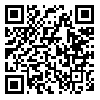Volume 28 - Supplementary
IBJ 2024, 28 - Supplementary: 17-17 |
Back to browse issues page
Download citation:
BibTeX | RIS | EndNote | Medlars | ProCite | Reference Manager | RefWorks
Send citation to:



BibTeX | RIS | EndNote | Medlars | ProCite | Reference Manager | RefWorks
Send citation to:
Najafi F, Kameli F, Rajaee M, Amiri Delui M, Sarkhosh P, Rezaian Z, et al . Effect of Marshmallow and Eucalyptus Nebulizer on Intensity of Patients Cough with COVID-19 Disease. IBJ 2024; 28 :17-17
URL: http://ibj.pasteur.ac.ir/article-1-4389-en.html
URL: http://ibj.pasteur.ac.ir/article-1-4389-en.html
Fatemeh Najafi 
 , Fatemeh Kameli *
, Fatemeh Kameli * 
 , Matina Rajaee
, Matina Rajaee 
 , Masoumeh Amiri Delui
, Masoumeh Amiri Delui 
 , Parastoo Sarkhosh
, Parastoo Sarkhosh 
 , Zahra Rezaian
, Zahra Rezaian 
 , Farnoosh Sharifimood
, Farnoosh Sharifimood 
 , Maryam Moradi
, Maryam Moradi 


 , Fatemeh Kameli *
, Fatemeh Kameli * 
 , Matina Rajaee
, Matina Rajaee 
 , Masoumeh Amiri Delui
, Masoumeh Amiri Delui 
 , Parastoo Sarkhosh
, Parastoo Sarkhosh 
 , Zahra Rezaian
, Zahra Rezaian 
 , Farnoosh Sharifimood
, Farnoosh Sharifimood 
 , Maryam Moradi
, Maryam Moradi 

Abstract:
Introduction: In December 2019, a new type of virus with pandemic capability was identified in humans, named COVID-19 by the World Health Organization. One of the most common complications of COVID-19 is cough. In recent years, people's and medical staff's attention to herbal treatments recommended in traditional medicine has increased. Eucalyptus and marshmallow plants have significant effects in reducing shortness of breath in infections and respiratory diseases, but so far, there is no research on the effect of these two on adjuvant treatment. The respiratory symptoms of COVID-19 have not been investigated; hence, the present study was conducted to compare the impact of marshmallows and eucalyptus nebulizers on cough severity in COVID-19 patients.
Methods and Materials: This randomized clinical trial study was conducted on 36 patients with COVID-19 who were hospitalized in the COVID Department of Allameh Bohloul Gonabadi Hospital from 1400 to June 1401. According to the inclusion criteria and the convenience sampling method, the samples were randomly selected into three groups: marshmallow, eucalyptus, and control (12 people in each group). To collect data, a demographic information questionnaire (age, sex, history of underlying disease, history of COVID-19, and hospitalization) and a checklist made by the researcher to record the number of coughs two hours before and after the intervention were used. In the following, the cough intensity was recorded 2 hours before the intervention. Then, 4 mL for the marshmallow group and 4 mL for the eucalyptus group were nebulized daily for 15 minutes. Two hours after the intervention, the cough intensity was again recorded in both groups. This intervention continued until the patients were hospitalized. No intervention was performed for the control group. SPSS version 20 software, one-way analysis of variance, Shapiro-Wilk, Likelihood Ratio, Kruskal-Wallis, and Friedman tests were used for data analysis.
Results: Before the intervention, there was no statistically significant difference between the three groups in terms of cough intensity (p > 0.05), but after the intervention on the second and third days, there was a statistically significant difference between the three groups in terms of cough intensity. However, the cough intensity in the marshmallow group was lower than in the other two groups (p = 0.05). Results of Friedman's test showed that the cough intensity in the patients improved during marshmallow and eucalyptus fumigation.
Conclusion and Discussion: Nebulizers containing marshmallows and eucalyptus enhanced cough severity in COVID-19 patients, but nebulizers containing marshmallows had a more significant effect on cough severity than eucalyptus. It is suggested that marshmallow and eucalyptus nebulizers be used as a treatment approach along with other treatment methods.
Methods and Materials: This randomized clinical trial study was conducted on 36 patients with COVID-19 who were hospitalized in the COVID Department of Allameh Bohloul Gonabadi Hospital from 1400 to June 1401. According to the inclusion criteria and the convenience sampling method, the samples were randomly selected into three groups: marshmallow, eucalyptus, and control (12 people in each group). To collect data, a demographic information questionnaire (age, sex, history of underlying disease, history of COVID-19, and hospitalization) and a checklist made by the researcher to record the number of coughs two hours before and after the intervention were used. In the following, the cough intensity was recorded 2 hours before the intervention. Then, 4 mL for the marshmallow group and 4 mL for the eucalyptus group were nebulized daily for 15 minutes. Two hours after the intervention, the cough intensity was again recorded in both groups. This intervention continued until the patients were hospitalized. No intervention was performed for the control group. SPSS version 20 software, one-way analysis of variance, Shapiro-Wilk, Likelihood Ratio, Kruskal-Wallis, and Friedman tests were used for data analysis.
Results: Before the intervention, there was no statistically significant difference between the three groups in terms of cough intensity (p > 0.05), but after the intervention on the second and third days, there was a statistically significant difference between the three groups in terms of cough intensity. However, the cough intensity in the marshmallow group was lower than in the other two groups (p = 0.05). Results of Friedman's test showed that the cough intensity in the patients improved during marshmallow and eucalyptus fumigation.
Conclusion and Discussion: Nebulizers containing marshmallows and eucalyptus enhanced cough severity in COVID-19 patients, but nebulizers containing marshmallows had a more significant effect on cough severity than eucalyptus. It is suggested that marshmallow and eucalyptus nebulizers be used as a treatment approach along with other treatment methods.

Type of Study: Full Length/Original Article |
Subject:
Related Fields
| Rights and permissions | |
 |
This work is licensed under a Creative Commons Attribution-NonCommercial 4.0 International License. |





.png)
